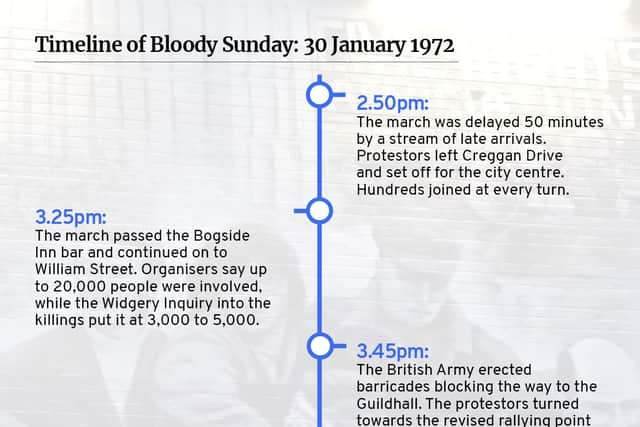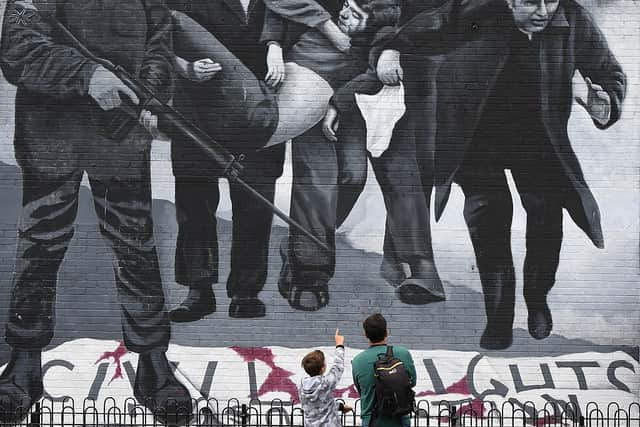Bloody Sunday 50th anniversary: how 1972 Derry event is being commemorated in Northern Ireland - what happened
and live on Freeview channel 276
Sunday 30 January 1972 is widely regarded as one of the darkest days of the Northern Ireland troubles, a day that would go on to be known as Bloody Sunday.
It all began when around 15,000 people gathered in Bogside, Derry to take part in a civil rights march.
Advertisement
Hide AdAdvertisement
Hide AdAfter members of the British Army’s Parachute Regiment opened fire on the demonstration, 13 people were shot dead; at least 14 people were injured, one of whom later died.
But how is the anniversary being commemorated?
Here is everything you need to know.
What happened?
The Northern Ireland troubles escalated in 1969 when British troops were sent to suppress nationalist activity by the Irish Republican Army (IRA) and quell religious violence between Protestants and Catholics.
Looking for a way to restore order, the government decided internment (imprisonment without trial) was the only option.
In August 1971, Operation Demetrius was launched, a British Army operation which involved the mass arrest and internment of people suspected of being involved with the IRA.
Advertisement
Hide AdAdvertisement
Hide AdThe introduction of internment, the way the arrests were carried out - and the abuse of those arrested - led to mass protests and a sharp increase in violence.
About 7,000 people fled or were forced out of their homes.


On 20 January 1972, thousands gathered in Derry for a march against internment organised by the Northern Ireland Civil Rights Association.
The Northern Ireland Assembly banned the protest, and troops were deployed to police and patrol the march.
The march was delayed by 50 minutes due to a stream of late arrivals, but set off for the city centre at 2.50pm, with hundreds joining at every turn.
Advertisement
Hide AdAdvertisement
Hide AdOrganisers claimed that just over half an hour later, 20,000 people were involved in the march. In response, the British Army erected barricades blocking the way to the Guildhall, the main body of the march.
Protestors turned towards a revised rallying point, but a number continued to confront soldiers where some rioting ensued, including minor clashes between stone throwers.
Another 30 minutes later, at a location away from the riot and march, soldiers in a derelict building fired a number of rounds after claiming they had come under attack. Two men were injured, with one of them dying six months later.
Around the same time the British Army began deploying water cannons, and shortly after, paratroopers were given an order to start arresting any remaining rioters.
Advertisement
Hide AdAdvertisement
Hide AdDespite being told not to engage in a running battle on Rossville Street, soldiers opened fire on people in the area of Rossville flats, leaving 13 dead and at least 15 others wounded.
How is it being commemorated?


The president of Ireland, Michael D Higgins, Taoiseach Micheal Martin and former Labour Party leader Jeremy Corbyn will feature in a programme of events to mark the 50th anniversary of Bloody Sunday.
President Higgins will deliver a recorded message to the Bloody Sunday families on Sunday 30 January.
The president’s message will be shown publicly during the commemorative event Beyond the Silence, which will take place before a limited audience in Guildhall Square.
Advertisement
Hide AdAdvertisement
Hide AdHis message will be broadcast on a large screen, and the occasion will be live-streamed to an online audience.
The event will be hosted by actor Adrian Dunbar and will feature tributes to the victims, as well as music and public performances.
Guildhall Square will then fall silent on Sunday at the precise time when 50 years earlier paratroopers opened fire on civil rights marchers.
Earlier in the day, relatives of those who were shot and injured will take part in a walk of remembrance.
Advertisement
Hide AdAdvertisement
Hide AdIt will set out from Creggan Shops and make its way to the Bloody Sunday Monument in Rossville Street for the annual memorial service and wreath-laying ceremony at 11am.
Irish premier Micheal Martin will lay a wreath and is also expected to meet privately with the families of those killed.
The 2022 Bloody Sunday Memorial Lecture will be delivered at Derry’s Guildhall on Saturday by Jeremy Corbyn, a long time supporter of the Bloody Sunday families.
The MP for Islington North in London will give his lecture at the same location where most of the hearings in the Bloody Sunday Inquiry took place.
Advertisement
Hide AdAdvertisement
Hide AdThe White Handkerchief , a new play dramatising the events of Bloody Sunday will also premier on the anniversary, and will be performed in the Guildhall in Londonderry.
The production, which will be available to a global audience on a live stream, is being presented by Derry’s Playhouse and will involve a cast of local actors.
The drama’s name is inspired by the iconic image of priest Fr Edward Daly waving a blood stained handkerchief as he led a group of people carrying one of the victims – 17-year-old Jackie Duddy – from the scene of the shootings.
A message from the editor:
Thank you for reading. NationalWorld is a new national news brand, produced by a team of journalists, editors, video producers and designers who live and work across the UK. Find out more about who’s who in the team, and our editorial values. We want to start a community among our readers, so please follow us onFacebook, Twitter and Instagram, and keep the conversation going. You can also sign up to our newsletters and get a curated selection of our best reads to your inbox every day.
Comment Guidelines
National World encourages reader discussion on our stories. User feedback, insights and back-and-forth exchanges add a rich layer of context to reporting. Please review our Community Guidelines before commenting.
